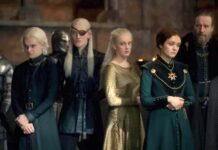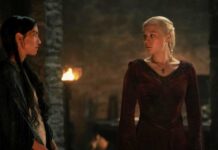As the decade draws to a close, we’re taking a look back at the ten years that changed television forever.
The end of the decade is nigh and we must ask ourselves, as we ask ourselves at the end of every decade, what have we really achieved these past ten years?
What has mankind collectively or not so collectively managed to manage in the 2010s? What have we actually done? The answer is television.
We’ve done a great job at television. Over the past ten years television has flourished to the point of insanity, proliferating and metastasising into a many-headed Hydra the likes of which previous generations had never seen.
Don’t believe us? Just ask your friendly neighbourhood TV critic. Their exhausted response, overwhelmed by every new show they’re expected to review, will tell you everything you need to know.
Remember, back in the August 2015 – truly an entire lifetime ago, when Barack Obama was still president of the United States and Brexit wasn’t even a glimmer in Boris Johnson’s eyes – when American TV executive FX chief John Landgraf ominously predicted a future he dubbed “peak TV”?
Remember how he pointed to the quality of productions coming from the small screen, the sheer number of new networks, the water-cooler nature of the shows that we watched?
Remember how he warned us all that we were approaching saturation point? “This is simply too much television,” Landgraf said at the time. “My sense is that 2015 or 2016 will represent peak TV in America, and that we’ll begin to see declines coming the year after that and beyond.”
Hindsight is 20/20, but even we can see how wrong Landgraf was. Since he made his pronouncement back in 2015, the amount of television being produced seasonally, let alone annually, has increased exponentially. Some 320 new series debuted in the first half of 2019 alone!
It wasn’t peak TV back in 2015. It still isn’t peak TV. Maybe the limit simply doesn’t exist.
So, yes, the last 10 years have brought about more – and more varied – television than we’ve ever had in our lifetimes. Most of it has been pretty bad. Some of it has been OK. And a few shows? Well, they’ve been great.
A handful of them even unimpeachably so. The 2010s might have been a decade of unrest and decay, but we always had television to return to.
Here are the best shows of the 2010s, in no particular order …
THE DRAMAS
THE GOOD WIFE
Yes, we are cheating by including this, as technically it began in 2009. But this is our list and we’ll include whatever series we damn well please.
The Good Wife earns its spot on the rankings because it got truly good around about season three – well into the 2010s – courtesy of sizzling onscreen chemistry between leads Alicia Florrick (Julianna Margulies) and Will Gardner (Josh Charles), and the series’ commitment to taking a stock standard legal procedural and shaking it up a little bit.
A stellar supporting turn from Christine Baranski as Alicia’s trailblazing female boss Diane Lockhart even spawned its own spin-off, The Good Fight. If that isn’t a sign of greatness, then we don’t know what is.
GAME OF THRONES
Whatever you think about that final season – and we’re really not going to relitigate that now – there’s no denying that Game of Thrones reshaped the landscape of television forever.
Epic in scope, yet constantly returning to the immensely relatable themes of power, lust, greed and family, this series became part of the fabric of popular culture, sending everyone mad for dragons, debating whether or not it was OK to love characters whose relationship was rooted in incest and turning Emilia Clarke, Kit Harington, Richard Madden and Sophie Turner into global superstars.
Winter came and went, not with a bang but a whimper, but we’ll always have Westeros.
THE AMERICANS
There are spy shows and there are spy shows, and this is of the latter. Anyone can write a spy series about a couple of James Bond-esque assassins dropped into enemy territory. But what about two Russian moles embedded into American society where they live, undetected, for decades?
And what if those two Russian spies, play-acting at a fake marriage, actually fell in love? (How could we forget those sex scenes in season two?) It helps that the series was driven by two gritty performances by Keri Russell and Matthew Rhys, now a real-life couple, but the heart of The Americans is elegant directing and tightly-wound screenwriting.
KILLING EVE
Just think about the very existence of Killing Eve, a show so resplendent with, quite literally, killer female performances awards shows have been struggling to single out just one actor for recognition.
There’s Jodie Comer, of course, with her star-is-born turn as psychotic assassin Villanelle, but what about Fiona Shaw as the wisecracking MI6 boss? And what about Sandra Oh – Sandra Freakin’ Oh! – as Eve, the desk agent who becomes perilously obsessed with tracking the assassin down?
This series, written and created by Phoebe Waller-Bridge in season one before being spearheaded by Emerald Fennell (Camilla Parker-Bowles from The Crown season three, in case you were wondering) is up there with The Americans when it comes to upending the spy genre.
THE CROWN
Three seasons in and Netflix’s grand royal family drama still sparks debate. Is it monarchist propaganda or delicious, soapy melodrama? Is it the greatest advertisement for the Queen or the thing that could spark the royal family’s downfall?
Or maybe, just maybe, it is fantastic entertainment, effortlessly elevating fact with just the right amount of fiction? The first two seasons, which focused on a portrait of the monarch as a young woman, as played with hesitance and crippling self-doubt by Claire Foy, are the best, even though the recently-released third season, starring Olivia Colman and Helena Bonham Carter, is still enjoyable.
HALT AND CATCH FIRE
That the computer revolution of the ’80s hasn’t been the focus of more pop culture is baffling, but at least we’ll always have Halt and Catch Fire.
This series, which premiered in 2014 and run until 2017, followed company Cardiff Electric, led by Joe MacMillan (Lee Pace), engineer Gordon Clark (Scott McNairy) and programmer Cameron Howe (Mackenzie Davis).
Like Mad Men, a show to which Halt and Catch Fire is frequently compared, the series had on-point historical detail, a killer soundtrack and writing that made its characters, particularly antihero Joe, sing.
The real thrill of the series, though, comes from its vision of the computer – and, later, the internet – as a place of joy and possibility and potential, a notion that couldn’t feel more foreign to the reddit and Twitter-using audiences of today.
THE HOUR
Gone far too soon, this BBC series ran for only two seasons comprising 12 episodes from 2011 until 2013. But oh, what two seasons they were! Starring Dominic West, Ben Whishaw and Romola Garai, the show charted the creation of a television show dedicated to current affairs in the mid-50s.
But, like a few other period dramas on this list this series was less interested in its characters’ onscreen project than in the characters themselves, and all the various ways they found themselves entwined with one another. The Hour was fizzy, sexy and full of 50s-era glamour, and we still miss it.
THE COMEDIES
VEEP
Veep is that rare thing, a series that not only survived a change in showrunners, after the departure of creator Armando Iannucci to make way for David Mandel (Curb Your Enthusiasm) in 2017, it got better. Or maybe not better, considering how sharply made the first four seasons of this Julia Louis Dreyfus-led political satire are, but different, giving fans of the series a fresh experience after so many years. In television, where plots go stale faster than sliced bread, that is a rare, rare thing.
Even rarer? Performances from the main cast including Dreyfus, Hugh Laurie, Anna Chlumsky, Tony Hale and Reid Scott, that also got better over time. The series, which finally bowed out in 2019, earned every single one of its 17 Emmy Awards.
FLEABAG
The first season of Fleabag premiered in 2016 and, though beloved by critics and fans alike, didn’t make huge waves.
Which is why the response to the second season of Phoebe Waller-Bridge’s anti-heroine comedy – 11 Emmy nominations, a $20 million-a-year Amazon deal for Waller-Bridge, every single one of those gifs of the Hot Priest kissing Fleabag as if his very life depended on it – took a lot of people by surprise.
But maybe it shouldn’t have, considering how searing the second series is, with its meditations on the inherent hopefulness and the sheer blinding optimism of falling in love. Or maybe it shouldn’t have, given how well Waller-Bridge’s assassin drama Killing Eve had been received by critics the previous year.
It doesn’t matter – surprises are a good thing. Especially when they are shaped and formed by the wit and wisdom of Waller-Bridge’s inimitable writing, and the generosity of spirit with which she embraces her characters: flaws, warts and all.
ATLANTA
How to sum up the rich and strange joys of Donald Glover’s Atlanta? The series, which was written, directed and produced by the multi-talented star, is one of the most consistently excellent comedy series on television, a statement that holds true across all of the series’ 21 episodes.
Glover stars as Earn, a Princeton dropout managing his cousin Paper Boi’s (Bryan Tyree Henry) burgeoning rap career. Lakeith Stanfield co-stars as Paper Boi’s best friend Darius, with Zazie Beetz as Earn’s on-again-off-again girlfriend Vanessa. (Go on – we challenge you to name a better cast on television today.)
Like any Glover project, the humour is both surreal and sophisticated, the acting is exemplary and the aesthetic divine. If you haven’t watched it yet, what are you waiting for?
THE LETDOWN
Comparisons between ABC comedy The Letdown and Fleabag abound, and rightly so. Both premiered in 2016 and took a long break before their second series aired in 2019. Both are centred on fascinating and lived-in female characters, with quirky ensemble casts and plenty of dark, snort-out-loud humour.
But where Fleabag zeros in on sexual politics, The Letdown is an unflinching and uncompromising look at the realities of motherhood. With two seasons under writer and star Alison Bell’s belt, with the potential for a third in the future, The Letdown is one of the best Australian series of the decade.
CATASTROPHE
After a one-night stand results in a surprise, unplanned pregnancy, Sharon (Sharon Horgan) and Rob (Rob Delaney) decide to make a go of it. What they find, though, and what this series excels at, is that even the most unplanned, surprise moments in life can be full of joy and grace and euphoria.
Written and created by Horgan and Delaney, this series consistently proved how gifted they both were, especially Horgan, in writing comedy and in acting with such lived-in, knowable emotion.
Horgan, an Irish comedian, would go on to be the powerhouse that she has become, collaborating with Sarah Jessica Parker on her series Divorce and penning an episode for Amazon Prime’s Modern Love.
SUCCESSION
It only launched in 2018, with a second season in 2019, so consider this one the series that snuck into the party at the very last minute before drinking all of the host’s booze and kickstarting a garrulous dance-off.
Succession, with its morality fable about a multimedia conglomerate and its patriarch, Logan Roy (Brian Cox, terrifying and inscrutable), looking to secure his company’s future, is certainly that.
Livewire performances from Kieran Culkin as Roy son Roman, as well as two searing turns by Jeremy Strong as brother Kendall and Aussie Sarah Snook as only daughter Shiv, are what elevate this series beyond mere “lifestyles of the rich and famous” porn. There is real bite here, and it stings.
THE CRIME SHOWS
MISS FISHER’S MURDER MYSTERIES
Whodunits have been a staple of popular culture since Agatha Christie first picked up her pen, hell, since Arthur Conan Doyle first decided that everything was elementary, dear Watson.
The trick is in how to subvert a storytelling trope that is as simple as ABC. Well, the ABC managed to do just that in Miss Fisher’s Murder Mysteries, their beloved adaptation of Kerry Greenwood’s crime novels centred on a glamorous female detective in 1920s-era Melbourne, solving crimes and flirting shamelessly with the stern-faced Inspector Jack Robinson while she does it.
SHERLOCK
Many have attempted to adapt the story of this iconic private detective for the screen, both big and small. But this BBC miniseries, which premiered in 2010 and ran for four seasons until 2017, is perhaps the best.
Created by famed British showrunner Steven Moffat and Mark Gatiss, it switched perspectives to present-day London and cleverly zeroed in on what makes the character of Sherlock (Benedict Cumberbatch) so interesting: not necessarily his preternaturally gifted way with reading people, but his relationship with partner-in-crime-solving Watson (Martin Freeman).
Featuring a pre-Hot Priest Andrew Scott as the dastardly Moriarty, not to mention Cumberbatch at the height of his Cumberbitch-mania, this series changed the crime genre forever.
TRUE DETECTIVE
The later series have been patchy at best, yes. But there’s no denying that the first season of True Detective was something special. Just the sheer act of seeing Matthew McConaughey, Movie Star, solving crimes on a small screen felt radical.
Now, with Meryl Streep and Reese Witherspoon clogging the televisual airwaves, casting movie stars in your TV project feels trite. But back in 2014 when the first season of True Detective aired, with its inscrutable mystery and its undeniable star power, it was like a jolt of adrenaline straight to the veins.
THE BRIDGE
If we remember the 2010s for anything, we will remember it as the decade we all went Nordic Noir mad. You can credit our collective obsession with Scandinavian crime series with The Bridge, or Broen, as it was known in its original Danish when it premiered in 2011. The series, which was remade five times – the UK version, starring Clemence Poesy, and the US version led by Diane Kruger being the most well-known – told the story of a dead body found on the bridge between Denmark and Sweden, causing two detectives from both sides to join forces, was dark and gritty and just the right amount of gruesome, setting the tone for the crime genre for the rest of the decade.
UNBELIEVABLE
A late-breaking entrant, but a worthy one. This story of a serial rapist and the all-female detective team who tracked him down, masterfully integrates a dual timeline in the telling of this gripping true story.
After premiering in September 2019, the series has picked up a brace of well-deserved Golden Globe nominations, including a double Best Actress nomination for stars Meritt Wever, as the cool-headed policewoman on the case, and Kaitlyn Dever, as an early victim of the rapist whose claims are ignored by everyone around her.
There were dozens more series that we could have mentioned, everything from Big Little Lies to Bojack Horseman, Justified, Black Mirror, When They See Us, The Handmaid’s Tale and The Leftovers.




















![[Book Review] The Blade Itself (The First Law Trilogy) by Joe Abercrombie](https://bendthekneegot.com/wp-content/uploads/2018/01/1516047103_maxresdefault-218x150.jpg)

















